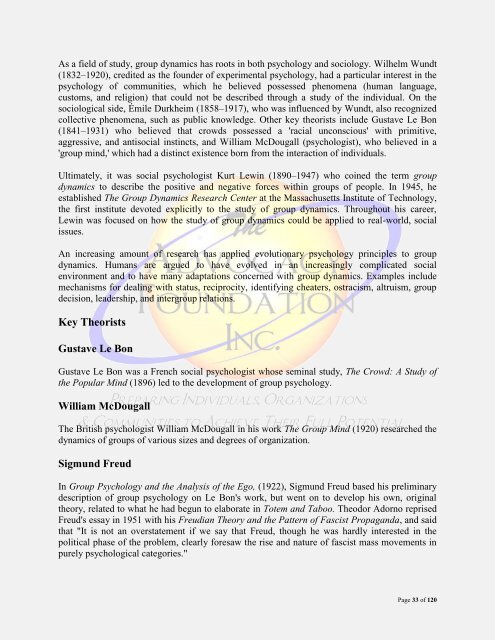Organizational Development - Vol. V, Part II
Organizational Development - Vol. V, Part II
Organizational Development - Vol. V, Part II
You also want an ePaper? Increase the reach of your titles
YUMPU automatically turns print PDFs into web optimized ePapers that Google loves.
As a field of study, group dynamics has roots in both psychology and sociology. Wilhelm Wundt<br />
(1832–1920), credited as the founder of experimental psychology, had a particular interest in the<br />
psychology of communities, which he believed possessed phenomena (human language,<br />
customs, and religion) that could not be described through a study of the individual. On the<br />
sociological side, Émile Durkheim (1858–1917), who was influenced by Wundt, also recognized<br />
collective phenomena, such as public knowledge. Other key theorists include Gustave Le Bon<br />
(1841–1931) who believed that crowds possessed a 'racial unconscious' with primitive,<br />
aggressive, and antisocial instincts, and William McDougall (psychologist), who believed in a<br />
'group mind,' which had a distinct existence born from the interaction of individuals.<br />
Ultimately, it was social psychologist Kurt Lewin (1890–1947) who coined the term group<br />
dynamics to describe the positive and negative forces within groups of people. In 1945, he<br />
established The Group Dynamics Research Center at the Massachusetts Institute of Technology,<br />
the first institute devoted explicitly to the study of group dynamics. Throughout his career,<br />
Lewin was focused on how the study of group dynamics could be applied to real-world, social<br />
issues.<br />
An increasing amount of research has applied evolutionary psychology principles to group<br />
dynamics. Humans are argued to have evolved in an increasingly complicated social<br />
environment and to have many adaptations concerned with group dynamics. Examples include<br />
mechanisms for dealing with status, reciprocity, identifying cheaters, ostracism, altruism, group<br />
decision, leadership, and intergroup relations.<br />
Key Theorists<br />
Gustave Le Bon<br />
Gustave Le Bon was a French social psychologist whose seminal study, The Crowd: A Study of<br />
the Popular Mind (1896) led to the development of group psychology.<br />
William McDougall<br />
The British psychologist William McDougall in his work The Group Mind (1920) researched the<br />
dynamics of groups of various sizes and degrees of organization.<br />
Sigmund Freud<br />
In Group Psychology and the Analysis of the Ego, (1922), Sigmund Freud based his preliminary<br />
description of group psychology on Le Bon's work, but went on to develop his own, original<br />
theory, related to what he had begun to elaborate in Totem and Taboo. Theodor Adorno reprised<br />
Freud's essay in 1951 with his Freudian Theory and the Pattern of Fascist Propaganda, and said<br />
that "It is not an overstatement if we say that Freud, though he was hardly interested in the<br />
political phase of the problem, clearly foresaw the rise and nature of fascist mass movements in<br />
purely psychological categories."<br />
Page 33 of 120

















